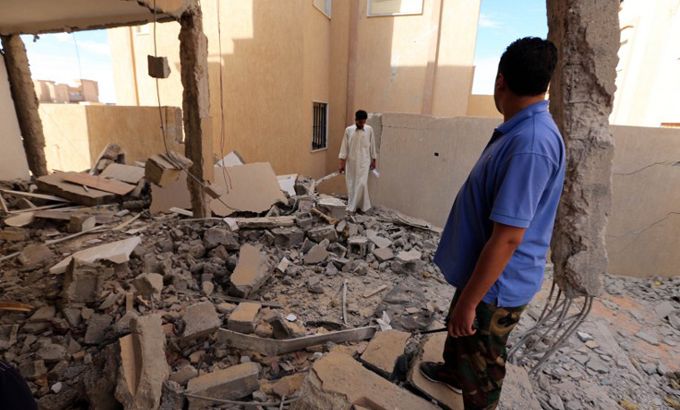Deadly fighting rages in Libya’s Bani Walid
Clashes around the besieged former Gaddafi stronghold continue to take their toll, a year after Libya was “liberated”.

At least three people have been killed and seven more injured in fighting in the northern Libyan town of Bani Walid.
The casualties come as clashes continue in the town of 85,000 residents, a former stronghold of ousted leader Muammar Gaddafi.
Libyan soldiers have been fighting Gaddafi loyalists in the beseiged town for more than three weeks. But troops blame officials for not providing enough equipment or supplies to win the battle.
“We have nothing,” Field Commander Mohamed Hetwash told Al Jazeera.
“We don’t know why. The problem is all the people here are under the administration of the minister of defence – and we buy the weapons, we buy the water, we buy the food, by ourselves. Rich people in Tripoli buy the food for us – the minister is absent.”
The shortages are worse inside the city, say families fleeing the violence, which comes exactly a year after Libya was declared “liberated” by armed fighters and opposition politicians.
Both food and water are scarce commodities, and the town’s hospital has come under fire, residents told reporters.
The isolated hilltop town, some 140km south of Tripoli, was one of the final bastions of Gaddafi support to surrender to the rebels after the former leader’s overthrow last year.
Pro-government forces moved up to Bani Walid early this month following the death of Omran Shaban, who died after two months in detention there. Shaban, from the city of Misurata, was the man who found Gaddafi hiding in a drain pipe outside Sirte on October 20, 2011.
Libya’s congress ordered the defence and interior ministries to find those suspected of abducting, torturing and killing
Shaban. It gave Bani Walid a deadline to hand them over.
Ongoing unrest
The siege of Bani Walid highlights the inability of new rulers of Libya to reconcile former rebel fighters and Gaddafi loyalists, and also its failure to bring many of the fighters that deposed the dictator fully under its control.
In scenes reminiscent of the civil war, scores of cars filled with families, and pick-up trucks laden with mattresses, children and food lined up at a government-run check point outside Bani Walid.
“We haven’t slept in days from the fear of dying and the sounds of shelling,” said Mohammed Abdel-Salam, as his car was searched. “My house was shelled with a rocket and destroyed. Medicine is becoming scarce in pharmacies, even food in shops.”
Two pro-government fighters were killed near Bani Walid on Monday, one of the fighters said. Libya state news agency LANA said on Sunday that 22 pro-government troops had been killed and some 200 wounded, but it did not say when.
A number of fleeing families were reportedly forced back to the western part of Bani Walid, when troops opened fire
at their convoy, a tribal elder inside the city told Reuters.
“The families wanted to take their children away from the violence but militias under the guise of government forces shot
at them to make them turn back,” said Mohammed Shetawi.
He said the central Bani Walid General Hospital had come under rocket attack and patients had to be evacuated on Sunday.
“The injured have been sent to hiding places, private homes and mosques, he said. “We hope these armed gangs will respect the mosques, but we don’t think so.”
‘Tribal’ rivalry
Wounded from Bani Walid, home to the Warfalla tribe, including women and children, were being treated in the nearby town of Tarhouna where hospital officials appealed for medicine.
Shetawi blamed fighters from Misurata for attacking Bani Walid. The Misurata tribe and the Warfalla are both parts of the Berber Hawwara confederacy.
“What you are seeing in Bani Walid is an age-old tribal feud between Misurata and Bani Walid, and the militias are using
the government as protection,” he said.
About 500 protesters broke into the grounds of Libya’s parliament building on Sunday to demand an end to the violence in Bani Walid.
Some 400 protesters also stormed the offices of a private television station in the eastern city of Benghazi on Saturday
after it announced the arrest of Gaddafi-era government spokesman Moussa Ibrahim and the capture and death of the
dictator’s son, Khamis Gaddafi.
No evidence was provided for either claim, and officials later apologised for announcing the news without confirmation.
“They are using this news to justify their violent actions against Bani Walid,” said Shetawi. “If they can pretend they have captured Gaddafi supporters inside the city then they think Libyans will support their campaign of violence.”